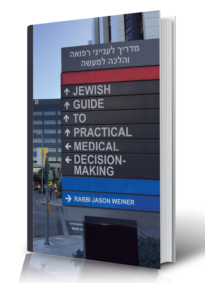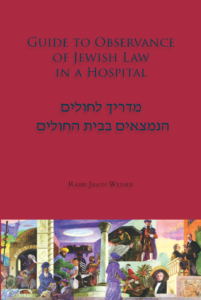
The Jewish tradition has important perspectives, history, and wisdom that can contribute significantly to crucial contemporary healthcare deliberations. Care and Covenant: A Jewish Bioethic of Responsibility demonstrates how numerous classic Jewish texts can contribute significant new ideas to some of the most urgent debates in the world of medicine today. Rabbi Jason Weiner draws on 15 years of experience of working in a hospital as a practitioner to develop an “ethics of responsibility”.
This book seeks to develop an approach to bioethical dilemmas that is primarily informed by personal and communal obligations as well as social responsibilities. Weiner applies some unique and inspiring values found in Judaism to encourage healthcare providers to remain dedicated to preventing harm and providing appropriate care to all. Each chapter investigates relevant philosophical questions such as what the expectations of a society or government are and what we should do when our obligations to others violate our own moral principles, safety or ability to assist.
Care and Covenant provides analytical, philosophical and evidence-based scholarship to guide discussions on ethics in healthcare.
 Jewish Guide to Practical Medical Decision-Making, is a book of original material on Jewish medical ethics, which presents the most up to date contemporary medical information and rabbinic rulings in an accessible, user-friendly manner. Rabbi Weiner addresses a broad range of medical circumstances such as surrogacy and egg donation, assisted suicide, and end of life decision making. Based on his extensive training and familiarity inside a major hospital, the goal of this work is to provide clear and concise practical guidance to facilitate complex decision-making for the most common medical dilemmas that arise in contemporary healthcare.
Jewish Guide to Practical Medical Decision-Making, is a book of original material on Jewish medical ethics, which presents the most up to date contemporary medical information and rabbinic rulings in an accessible, user-friendly manner. Rabbi Weiner addresses a broad range of medical circumstances such as surrogacy and egg donation, assisted suicide, and end of life decision making. Based on his extensive training and familiarity inside a major hospital, the goal of this work is to provide clear and concise practical guidance to facilitate complex decision-making for the most common medical dilemmas that arise in contemporary healthcare. This booklet, Guide to Observance of Jewish Law in a Hospital, is designed to assist people observing traditional Jewish Law while undergoing medical treatment, especially in the complex and unfamiliar environment of a hospital. The strength of this work is its brevity, as it provides easy access to answers on numerous questions that can arise in a hospital—including proper observance of Shabbat, kashrut, festivals, and numerous other ritual observances. This collection is an indispensable resource for hospital chaplains (of any faith), and an essential guide for a rabbi involved in pastoral and communal affairs. Most of all, it is written with the layperson in mind, to quickly provide answers to many of the common questions of observance that arise for patients in a hospital.
This booklet, Guide to Observance of Jewish Law in a Hospital, is designed to assist people observing traditional Jewish Law while undergoing medical treatment, especially in the complex and unfamiliar environment of a hospital. The strength of this work is its brevity, as it provides easy access to answers on numerous questions that can arise in a hospital—including proper observance of Shabbat, kashrut, festivals, and numerous other ritual observances. This collection is an indispensable resource for hospital chaplains (of any faith), and an essential guide for a rabbi involved in pastoral and communal affairs. Most of all, it is written with the layperson in mind, to quickly provide answers to many of the common questions of observance that arise for patients in a hospital.Books Rabbi Weiner Contributed to
-
Esther in America – Koren Publishers
- Rabbi Weiner has a chapter in this book
-
Jewish End-of-Life Care in a Virtual Age: Our Traditions Reimagined
- Rabbi Weiner has a chapter in this book
-
Praying for the Defenders of Our Destiny: The Mi Sheberach for IDF Soldiers
- Rabbi Weiner has a chapter in this book
-
Touro Medical Halacha Annual: Vol. 1
- Rabbi Weiner has an article in this book
Rabbi Weiner’s English Translation